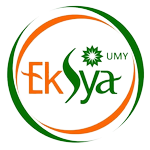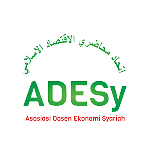Religiosity as a Stress Buffer: An Investigation of Muslim Women's Work-Life Conflict and Job Stress among Minangkabau Women
DOI:
https://doi.org/10.18196/jiebr.v3i2.213Keywords:
Job Stress, Perceived Social Support, Work-Life Conflict, Religiosity, Women WorkersAbstract
This study investigates the impact of work-life conflict on work stress among Minangkabau women in diverse organizational settings. Data from 179 respondents were collected through purposive sampling using a survey approach. The research instrument incorporated variables such as perceived social support, work-life conflict, religiosity, and work stress. Confirmatory Factor Analysis (CFA) and Structural Equation Modeling (SEM) were employed for data analysis. Results indicate a significant influence of work-life conflict and religiosity on work stress levels, underscoring its pivotal role in shaping employees' psychological well-being. However, hypotheses concerning perceived social support (PSS) were not supported, revealing the intricacy of these relationships. Hypothesis testing demonstrated a notable relationship between work-life conflict and work stress, while perceived social support exhibited no significant impact. The discussion highlights the imperative of managing work-life conflict for stress reduction. The complex interplay among religiosity, perceived social support, and stress levels, moderated by contextual factors, was acknowledged. Recommendations include further research on religiosity and stress, exploring factors influencing PSS, and an in-depth analysis of social support dynamics. In conclusion, this study enhances our comprehension of nuanced relationships impacting work stress, providing insights for future interventions and managerial strategies to foster a supportive work environment.
References
Ahmad, S. R., Prasad, K. D. V, Bhakuni, S., Hedau, A., Narayan, P. B. S., & Parameswari, P. (2023). The role and relation of emotional intelligence with work-life balance for working women in job stress. The Scientific Temper, 14(01 SE-Study Report), 233–237. https://doi.org/10.58414/SCIENTIFICTEMPER.2023.14.1.30
Aimifrina, A. (2022). Minangkabau Women in the Novel Mengurai Rindu by Nang Syamsuddin. KnE Social Sciences. https://doi.org/10.18502/kss.v7i6.10620
Bowling, N. A., Alarcon, G. M., Bragg, C. B., & Hartman, M. J. (2015). A Meta-Analytic Examination Of The Potential Correlates And Consequences Of Workload. Work & Stress, 29(2), 95–113. https://doi.org/10.1080/02678373.2015.1033037
Chen, Y., Peng, Y., Zhang, W., & Wei, W. (2018). Impact Of Social Support On Psychological Symptoms Among People With Type 2 Diabetes: A Moderated Mediation Model. Frontiers in Psychology, 9(1), 1484–1452. https://doi.org/10.3389/fpsyg.2018.01484
Cohen, S., Kamarck, T., & Mermelstein, R. (1983). A Global Measure Of Perceived Stress. Journal of Health and Social Behavior, 385–396.
Conte, J. M., Jacobs, R. R., & Tetenbaum, T. J. (2016). The Effects Of Work-Life Balance On Job Satisfaction, Life Satisfaction, And Mental Health Among Hospital Nurses. Health Care Management Review, 41(2), 165–174.
Eagly, A. H., & Carli, L. L. (2007). Through The Labyrinth: The Truth About How Women Become Leaders. Harvard Business Review Press.
Fatmariza, F., & Febriani, R. (2019). Domestic Violence And The Role Of Women In Modern Minangkabau Society. Proceedings of the 2nd International Conference on Local Wisdom, INCOLWIS 2019, August 29-30, 2019, Padang, West Sumatera, Indonesia, 101–118. https://doi.org/10.4108/EAI.29-8-2019.2288950
Ford, M., & Parker, L. (2008). Women and Work in Indonesia (Vol. 5). Routledge. https://doi.org/10.4324/9780203932360
Fornell, C., & Larcker, D. F. (1981). Evaluating Structural Equation Models with Unobservable Variables and Measurement Error. Journal of Marketing Research, 18(1), 39–47. https://doi.org/10.2307/3151312
Gadzali, S. S. (2020). Optimizing Work Satisfaction: An Empirical Study from Female Bank Managers in Indonesia. International Journal of Research and Review, 7(1), 511–520.
Gnanaselvi, G., & Shanmugapriya, S. (2018). Job Stress Among Women Employees. International Journal of Current Research and Modern Education (IJCRME), 3(1), 170–174. https://doi.org/10.5281/ZENODO.1170822
Greenhaus, J. H., & Beutell, N. J. (1985). Sources Of Conflict Between Work And Family Roles. Academy of Management Review, 10(1), 76–88.
Guo, J., & Chen, H. T. (2022). How does political engagement on social media impact psychological well-being? Examining the mediating role of social capital and perceived social support. Computers in Human Behavior, 133(July 2021), 107248. https://doi.org/10.1016/j.chb.2022.107248
Hair, J. F., Hult, G. T. M., Ringle, C., & Sarstedt, M. (2014). A Primer on Partial Least Squares Structural Equation Modeling (PLS-SEM). SAGE Publications Sage CA: Los Angeles, CA.
Han, Y., Lee, S., Hur, W.-M., & Le, H.-S. (2023). The mixed blessing of coworker support: understanding family-work conflict, emotional exhaustion, and job satisfaction. Baltic Journal of Management, 18(2), 141–156. https://doi.org/10.1108/bjm-04-2022-0137
Hanif, A., Yuliani, T. D., Rikarno, R., & Budiman, N. (2023). Sociological Studies Minangkabau Traditional Mariage. Melayu Arts and Performance Journal, 6(1), 96. https://doi.org/10.26887/mapj.v6i1.3739Hassan, S., Majid, M. A. A., Ismail, I., & Hamid, A. (2018). The Relationship Between Religiosity And Stress Among University Students: A Literature Review. Journal of Religion and Health, 57(4), 1435–1448.
Helfi, H. (2015). Buruh Tani Wanita Panggilan Dan Eksistensinya Menurut Adat Minangkabau. El Harakah: Jurnal Budaya Islam, 17(1), 84–100. https://doi.org/10.18860/EL.V17I1.3089
Hochschild, A. R. (1989). The Second Shift: Working Parents And The Revolution At Home. Viking.
Irawanto, D. W., Noermiyati, & Primasari, D. (2015). The Effect Of Occupational Stress On Work Performance Of Female Employees: Study In Indonesia. Asia-Pacific Journal of Management Research and Innovation, 11(4), 336–345. https://doi.org/10.1177/2319510X15602970
Jadmiko, P., & Azliyanti, E. (2023). Optimizing Social Support: Building Resilience to Work-Related Stress in Women through Managing Conflict Between Work and Personal Life. Jurnal Ekonomika Dan Bisnis , 3(3 SE-Articles), 449–455. https://doi.org/10.47233/jebs.v3i3.1285
Johnson, R. A., Smith, L. M., & Williams, S. L. (2021). Coping Strategies And Social Support: Moderators Of The Relationship Between Work Stressors And Job Satisfaction. Journal of Occupational Health Psychology, 26(1), 89–99.
Karadaş, A., & Duran., S. (2022). The Effect Of Social Support On Work Stress In Health Workers During The Pandemic: The Mediation Role Of Resilience. Journal of Community Psychology, 50(3), 1640–1649. https://doi.org/10.1002/JCOP.22742
Kaul, N., Kumar, C., Deshpande, A., & Mittal, A. (2023). How does relational attachment mediate the social support – career regret relation? Global Knowledge, Memory and Communication. https://doi.org/10.1108/gkmc-11-2022-0262
Kavosi, Z., Ranaei Kordshouli, H., Zare Saadabadi, M., & Ghorbanian, A. (2018). The Factors Related To The Employees’ Job Stress: A Meta-Analysis. Health Management & Information Science, 5(4), 145–151.
Khan, A., & Rahman, S. (2019). The Role of Religiosity in Alleviating Work-Related Stress Among Women in High-Powered Careers. Journal of Religion and Health, 58(5), 1543–1559.
Kim, E. Y., Cho, J., Cho, J. H., & Kim, J. (2020). The Influence of Gender Role Orientation on the Relationship between Perceived Job Stress and Psychological Well-Being among Korean Employees. International Journal of Environmental Research and Public Health, 17(3), 923–936.
Kurniawati, N. I., Werdani, R. E., & Pinem, R. J. (2018). Analisis Pengaruh Work Family Conflict Dan Beban Kerja Terhadap Stres Kerja Dalam Mempengaruhi Turnover Intention (Studi Pada Karyawan PT. Bank Negara Indonesia (Persero), Tbk Wilayah Semarang). Jurnal Administrasi Bisnis, 7(2), 95–102. https://doi.org/10.14710/JAB.V7I2.22694
Li, H., Liu, Z., Liu, R., Li, L., & Lin, A. (2018). The Relationship Between Work Stress And Work Ability Among Power Supply Workers In Guangdong, China: A Cross-Sectional Study. BMC Public Health, 16(1), 1–8.
Liu, H., Zhang, J., Wang, Y., & Zhang, Y. (2020). Supervisor Support And Job Stress Among Chinese Hospital Nurses: The Mediating Role Of Psychological Capital. Frontiers In Psychology. Journal of Psychosocial Nursing and Mental Health Services, 1(1), 567373. https://doi.org/10.3389/fpsyg.2020.567373
Lukiastuti, F., & Lissa’dijah. (2021). The Role of Work Stress Mediation in the Relationship of Multiple Role Conflict and Female Employee Performance. Manajemen Bisnis, 11(1), 12–25.
Macdonald, W. A. (2018). Workload And Workplace Stress. In Work Stress (pp. 113–138). Routledge. https://doi.org/10.4324/9781315223339-6
Mishra, P., Bhatnagar, J., Gupta, R., & Wadsworth, S. M. (2019). How Work’ Family Enrichment Influence Innovative Work Behavior: Role Of Psychological Capital And Supervisory Support. Journal of Management & Organization, 25(1), 58–80.
Muhareni, I., Rusdi, M., & Shalihah, B. M. (2022). Pengaruh Work Family Conflict Dan Beban Kerja Terhadap Kinerja Karyawan Wanita Dengan Stres Kerja Sebagai Variabel Intervening. Al Huwiyah: Journal of Woman and Children Studies, 2(1), 1–14.
Nova, N., & Ispriyanti, D. (2012). Analisis Tingkat Stress Wanita Karir Dalam Peran Gandanya Dengan Regresi Logistik Ordinal (Studi Kasus Pada Tenaga Kerja Wanita Di Rs. Mardi Rahayu Kudus). Media Statistika, 5(1), 37–48. https://doi.org/10.14710/MEDSTAT.5.1.37-48
Oludayo, A. O., & Omonijo, D. O. (2020). Work-Life Balance: Relevance Of Social Support. Academy of Strategic Management Journal, 19(3), 1–10.
Omoniyi, M. B. I. (2008). Psychological Well-Being of the Dual Career Women as Function of Work Place Stressors. Nigerian Journal of Guidance and Counselling, 12(1), 108–116. https://doi.org/10.4314/NJGC.V12I1.37070
Özer, G., Özbek, V., Elçi, M., & Aydın, K. (2013). Concurrent Validity of Different Relıgiosity Scales Used In Researches of Marketing Ethics and a Proposal for a New Religiosity Scale. Anadolu University Journal of Social Sciences, 13, 15–28. https://api.semanticscholar.org/CorpusID:131764959
Patel, R., & Sharma, P. (2020). The Cultural Context of Religiosity and Work-Related Stress in Female Career Professionals: A Cross-Cultural Study. International Journal of Cross-Cultural Management, 20(2), 179–196.
Pilcher, J. J., & Bryant, S. A. (2016). Implications Of Social Support As A Self-Control Resource. Frontiers in Behavioral Neuroscience, 10(1), 228–234. https://doi.org/10.3390/IJERPH10010375
Pradipta, L. (2020). Reconnecting Culture And Resilience: Understanding Minangkabau Women Strategies In Disaster Management. 22(2), 286–293. https://doi.org/10.25077/JANTRO.V22.N2.P286-293.2020
Putri, D. I. M., & Sintaasih, D. K. (2018). The Role Of Job Stress In Mediating The Influence Of Work-Family Conflicts On Job Satisfaction In Women Employees. Jurnal Ekonomi & Bisnis JAGADITHA, 5(1), 72–83. https://doi.org/10.22225/JJ.5.1.532.72-83
Retnaningsih, U. O. (2013). Indonesian Educated Unmarried Career Women: Gender Inequality, Discrimination, And Prejudices. Asian Women, 29(1), 5–25.
Rivera-Torres, P., Araque-Padilla, R. A., & Montero-Simo, M. J. (2013). Job Stress Across Gender: The Importance Of Emotional And Intellectual Demands And Social Support In Women. International Journal of Environmental Research and Public Health, 10(1), 375–389. https://doi.org/10.3390/IJERPH10010375
Roberts, J. A., Lapidus, R. S., & Chonko, L. B. (1997). Salespeople and Stress: The Moderating Role of Locus of Control on Work Stressors and Felt Stress. Journal of Marketing Theory and Practice, 5(3), 93–108. https://doi.org/10.1080/10696679.1997.11501773
Sconfienza, C., Lindfors, P., Lantz Friedrich, A., & Sverke, M. (2019). Social Support At Work And Mental Distress: A Three-Wave Study Of Normal, Reversed, And Reciprocal Relationships. Journal of Occupational Health, 61(1), 91–100.
Sebastian, A. (2022). Matrilineal practices among muslims: An ethnographic study of the Minangkabau of West Sumatra. Ethnography, 146613812211471–146613812211471. https://doi.org/10.1177/14661381221147137
Smith, A., & Jones, B. (2017). Exploring the Influence of Religious Diversity in the Workplace on the Relationship between Religiosity and Job Stress. Journal of Organizational Psychology, 45(3), 275–289.
Syafrizaldi, S. (2020). Employee Work Stress Based On Gender Differences During The COVID-19 Pandemic. INSPIRA: Indonesian Journal of Psychological Research, 1(2), 30–37. https://doi.org/10.32505/INSPIRA.V1I2.2835
Tadesse, K. (2017). The Relationship Between Job Stress And Employee’s Intention To Leave Their Organization. TIJ’s Research Journal of Commerce & Behavioural Science - RJCBS, 1(1), 150043599.
Tamunomiebi, M. D., & Mezeh, A. A. (2021). Workplace Stressors And Employee Performance: A Conceptual Review. Asian Journal of Economics, Business and Accounting, 21(4), 58–67.
Uchino, B. N., Cronan, S., Scott, E., Landvatter, J., & Papadakis, M. (2020). Social Support And Stress, Depression, And Cardiovascular Disease. In Cardiovascular implications of stress and depression (pp. 211–223). Elsevier. https://doi.org/10.1016/B978-0-12-815015-3.00009-X
Wang, Q., Guan, M., & Zhao, M. (2019). Workplace Social Support, Role Stress, And Work-Family Conflict: A Cross-Level Moderating Model. Frontiers in Psychology, 10(1), 1497–1502. https://doi.org/10.3389/fpsyg.2019.01497
Yang, J., & Chen, L. (2021). Community Religious Support and Stress Reduction Among Women in High-Pressure Careers: A Comparative Analysis. Journal of Applied Social Psychology, 51(3), 312–329.
Yusnita, R. T., & Nurlinawaty, R. (2022). Bagaimana Stres Kerja dan Work Life Balance pada Pekerja Wanita Memediasi Work Family Conflict dengan Prestasi Kerja? Jurnal Manajemen Dan Organisasi, 13(3), 257–269. https://doi.org/10.29244/jmo.v13i3.40867
Zakiy, M., Nur, R., & As, S. (2023). Self-Efficacy as a Moderating Variable The Effect of Organizational Change on Work Stress and Employee Performance in Islamic Banks. FIRM Journal of Management Studies, 8(1). https://doi.org/10.33021/firm.v8i1.4200 Self-Efficacy
Zhang, H., Tang, L., Ye, Z., Zou, P., Shao, J., Wu, M., Zhang, Q., Qiao, G., & Mu, S. (2020). The Role Of Social Support And Emotional Exhaustion In The Association Between Work-Family Conflict And Anxiety Symptoms Among Female Medical Staff: A Moderated Mediation Model. BMC Psychiatry, 20(1), 1–9. https://doi.org/10.1186/S12888-020-02673-2
Zulfa, Z., Husnita, L., & Kaksim, K. (2016). The Empowerment of Gold Miners Woman in Minangkabau to Support Household Economy. MIMBAR: Jurnal Sosial Dan Pembangunan, 32(1), 187–193. https://doi.org/10.29313/MIMBAR.V32I1.1731
Downloads
Published
How to Cite
Issue
Section
License
Copyright (c) 2023 Journal of Islamic Economic and Business Research

This work is licensed under a Creative Commons Attribution-NonCommercial 4.0 International License.
Journal of Islamic Economic and Business Research has CC-BY NC or an equivalent license as the optimal license for the publication, distribution, use, and reuse of scholarly work for non-commercial purpose. The non-commercial use of the article will be governed by the Creative Commons Attribution license as currently displayed on Creative Commons Attribution-NonCommercial 4.0 International License
Creative Commons License




